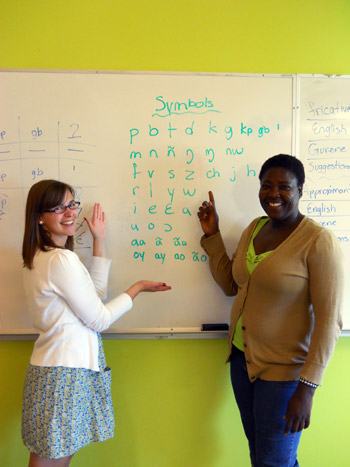Written language may improve access to education, health care, and government

Robyn Giffen and Vida Yakong with the new Nabit alphabet
Fourth-year UBC undergraduate student Robyn Giffen has teamed up with PhD candidate Vida Yakong to create a writing system for the language of Nabit, an oral spoken language in Northern Ghana.
By first creating an alphabet, and consequently a fully-functional writing system, Giffen and Yakong hope people in the Nabdam district in Northern Ghana will have better access to essential services of education, health care, and government. All are currently delivered in a language not fully understood by most Nabit speakers, which limits their ability to influence those essential services.
“Within Ghana, there are 79 recognized languages, not including dialects. Nabit is at-risk of going extinct, along with all the knowledge and culture embedded within it,” says Giffen, an anthropology student who received an Undergraduate Research Award (URA) through the Irving K. Barber Endowment in support of her work.
Yakong, a PhD candidate in Interdisciplinary Graduate Studies at UBC’s Okanagan campus, is from Northern Ghana and fluently speaks Nabit. In 2007 she launched Project GROW (Global Rural Opportunities for Women) — an initiative that aims to generate economic opportunities for women in rural Ghana.
“Vida and I started the project by recording the language of Nabit — using words specific to the villages — and then analyzing the individual sounds to create an orthography,” says Giffen. “Nabit speakers hope to learn both written Nabit and English, so it was beneficial for the writing systems to be similar. However, for sounds that were unique to Nabit, we explored options from other languages.”
“For the Nabit-speaking people, literacy means pride and security,” adds Yakong. “It would mean the preservation of culture and history, and it would mean a greater ability to control and influence essential services and government.”
The 52-letter alphabet, along with a writing tool and guide, will soon be sent to community elders and leaders in the Nabdam district for their review and feedback.
The idea for Giffen’s URA project was sparked by doctoral research by Cindy Bourne, a PhD candidate in the Faculty of Education, who — through her work with Project GROW and research on adult literacy in Northern Ghana — identified the desire and need for a writing system for Nabit.
Although Giffen’s project is now complete, the work in preserving the Nabit language will develop and expand as Bourne continues with research on how best adult literacy programs can be implemented in Nabit speaking communities.
Approximately 45 per cent of the population of Ghana, ages 15 and older, are illiterate. Nabit-speaking women often use their fingerprint to sign documents, considered degrading, as their ink-stained fingers also mark their illiteracy. And students are educated in either English or Gurene — two languages that a Nabit-speaker does not understand. Both children and adults who learn to read and write in their mother tongue have an easier time learning English than those who are not educated in their first language.
“The establishment of a writing system is essential — it is an important tool to help empower both women and men, not only because they will able to sign their own name, but they’ll be able to read and write, a skill that should be considered a human right,” says Giffen.
— 30 —